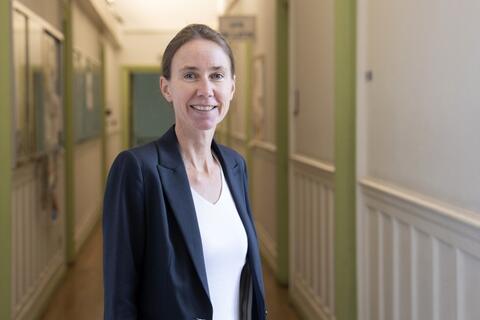
Juliette Dross
Co-pilot of the "Changing Societies" thematic program
In my work, I try to build or strengthen bridges between academic knowledge and society.
Juliette Dross is an academic researcher in classics and a specialist in ancient rhetoric. Alongside Caroline Michel d'Annoville, she co-pilots the SOUND project's "Changing Societies" thematic program. She talks about her involvement in this trans-disciplinary, socially relevant project.
Tell us a little about your background and your current position.
Juliette Dross: Following my studies at the ENS and the agrégation in classics, I defended a thesis in Latin studies, focusing on Roman rhetoric and philosophy. I joined Sorbonne University's Faculty of Arts and Humanities in 2005, as an associate professor in the Latin department, where I have been habilitated to direct research (HDR) since 2019. My research focuses on Roman stoicism, but also on ancient rhetoric, whose contemporary uses I study in particular from a pedagogical perspective..
Can you tell us about the objectives and challenges of the SOUND project?
J. D.: The main objective of SOUND is to bring the knowledge and expertise of the Sorbonne University Alliance (ASU) into the public sphere, around the three thematic programs (Changing Societies / Global Approach to Health / Sustainable Worlds), which correspond to the major challenges of our time. The trans-disciplinary project will create links between the ASU community and society (citizens, young people, associations, decision-makers, etc.), as well as between members of our university community. It will be a major lever for showcasing and highlighting what is being done at ASU, and for developing new partnerships and events around the links between science and society.
Why did you decide to become co-pilot of the theme "Changing Societies"?
J. D.: Because disseminating research and anchoring science, in the broadest sense of the term, in society and the region are issues that are particularly close to my heart. It's important that the voice of researchers is more present and listened to in the public sphere, that the expertise of our academic community benefits the general public and carries weight with decision-makers. This will help us to meet the major challenges facing our societies collectively. In my work, I try to build or strengthen bridges between academic knowledge and society by linking antiquity and the contemporary world. SOUND will enable me to change scale and promote this perspective throughout Sorbonne University and ASU: it's a great challenge!
What will be your role as a copilote ?
J. D.: As pilots of the "Changing Societies" program, our role, along with Caroline Michel d'Annoville, is to define and promote the program's scientific policy and priority themes, in conjunction with the "Global Approach to Health" and "Sustainable Worlds" programs. Together with the other SOUND pilots, and with the support of the scientific committees, we will be meeting with the various players in our community to gain a better understanding of all ASU's strengths, and to relay to them the challenges of this transdisciplinary project and the priorities of the three programs. We'll be working with Sorbonne University's three faculties and all ASU members, as well as with the Institutes and Initiatives.
